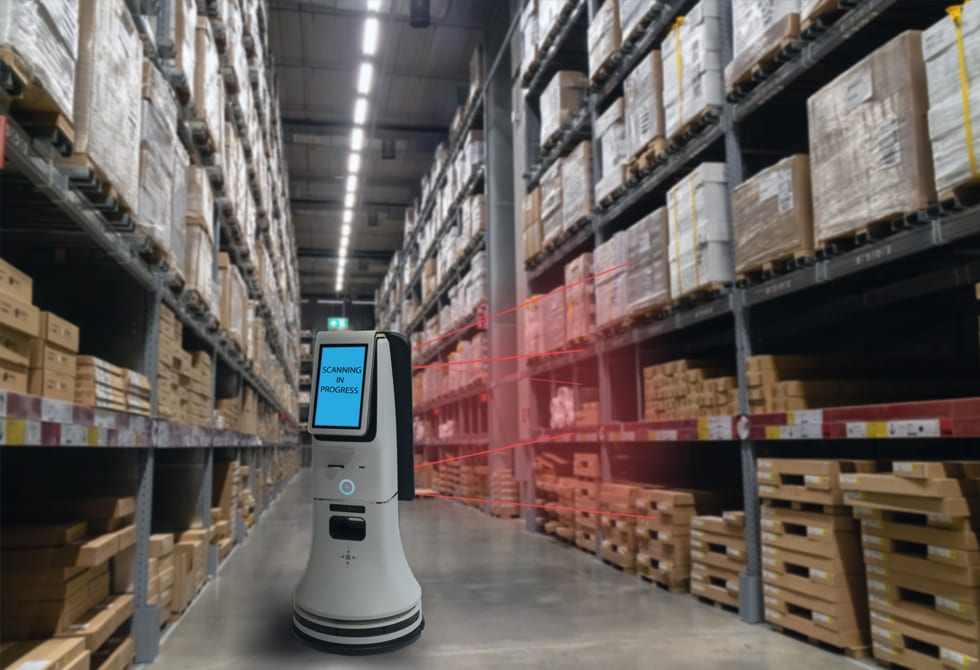
New technologies, such as artificial intelligence (AI), have affected most industries, and logistics is no exception. The development of AI has revolutionized the field of logistics. The most significant advancements this technology has brought include warehouse automation, autonomous vehicles, predictive analytics, and smart roads. This powerful technology offers to automate and simplify numerous processes, thus helping companies save both time and money. It’s no wonder giants like Amazon and Google have started investing in AI. That is why we have decided to analyze the advancing role of AI in the logistics industry.
BIGGEST TRENDS OF AI IN LOGISTICS
AUTONOMOUS VEHICLES
We have all heard about driverless cars, but artificial intelligence in the logistics industry also allows automating other vehicles for transporting goods, such as vans, trucks, or buses. Autonomous vehicles can work on their own or with a human driver.
However, these vehicles are not fully autonomous yet. Current regulations and technology do not allow having autonomous vehicles on the roads without drivers. According to many countries’ laws, the driver still has to be behind the wheel to control the situation on the road and analyze potential risks, but that is expected to change in the future.
This type of technology can bring lots of benefits to logistics. Automated vehicles bring changes to the supply chain and help save time and reduce costs. But more importantly, driverless technology could help reduce the number of accidents. Moreover, it helps the environment by reducing fuel usage.
ARTIFICIAL INTELLIGENCE IN WAREHOUSE AUTOMATION
This year has brought new problems and solutions to look out for. Many large corporations require fast and advanced logistics solutions, which is why they are investing their resources in AI technology and robotics. Many routine tasks are facilitated thanks to warehouse automation. AI is transforming warehousing processes, such as collecting and analyzing information and inventory processes, enabling companies to increase efficiency and boost revenues.
In warehousing, AI is used to make demand predictions, modify orders, and re-route products in transit. You can adjust your orders according to these predictions and have the in-demand goods delivered to local warehouses as needed. In case there are multiple warehouses in the chain, AI can connect them to find the best option for transporting the inventory. When you predict the demand for certain products and plan the logistics well in advance, you can improve your service, cut transportation costs, and save a lot of money.
Computer vision technology used in warehousing allows recognizing and organizing items. In the future, this type of technology will help perform quality control and eliminate the need for human supervision.
SMART ROADS
Another application of artificial intelligence in the logistics industry is smart roads. Several companies are working on building them. Smart roads help improve road safety and reduce delays in the supply chain caused by unfavorable weather conditions, making deliveries faster.
Smart roads are equipped with solar panels and LED lights. Solar panels are used to produce electricity and prevent roads from being slippery during winter months, as they have the ability to heat up. LED lights alert drivers about the changing road conditions. Smart roads provide highly valuable information for businesses that use them to transport their products. Roads with fiber optic sensors are connected to the internet and can sense traffic volumes and patterns and warn drivers of upcoming traffic jams. They can also sense when vehicles leave the road or when an accident occurs and alarm emergency services.
BETTER DEMAND PREDICTION
Predicting future needs regarding the number of goods and supplies is vital for running a successful company. When companies fail to make accurate predictions, and the amount of goods does not meet the high demand, they lose money, which is the last thing they want. If your predictions are inaccurate, you risk running short of inventory and losing sales. Your customers won’t hesitate to turn to your competition unless you can meet their needs.
Artificial intelligence offers algorithms that can predict these trends. Certain AI-based tools can make predictions even better than human specialists, which means lower inventory and simplified warehouse management.
Another benefit of AI in logistics is enhancing the customer experience. AI can ensure a better customer experience through personalization and product suggestions based on customers’ buying habits and personal preferences. Customers will appreciate a more personalized experience and become more loyal to the company.
BACK OFFICE OPERATIONS
Back-office operations are crucial for the logistics industry. AI plays a huge role in improving the speed and accuracy of many back-office operations.
Combining AI with Robotic Process Automation (RPA) has created a technology called cognitive automation. In combination with RPA, AI enables employees to improve their performance by increasing productivity and accuracy. For example, some repetitive data-related tasks can be automated with the help of AI. This way, back-office automation helps companies with supply chains save both time and money. With this type of technology, some categories of employees, such as accountants and human resources specialists, can be replaced. Consequently, the probability of human error will be lower.
⚠︎ Important Disclaimer:
We use systems to help you to maintain a lean inventory and manage costs, but we do not provide the tools of artificial intelligence.
Our role as a partner is to add value to your supply chain through storage and transportation services.
CONCLUSION
Embracing new technologies is one of the best strategies to improve your supply chain. As you can see, AI has numerous uses in the supply chain and the logistics sector. Companies all over the world are implementing this powerful technology into their everyday operations. Artificial intelligence helps speed up and simplify various essential processes. Automating routine tasks that otherwise take a lot of time improves efficiency and accuracy and reduces the probability of human error. As a result, the implementation of AI in the logistics industry can reduce expenses and increase customer satisfaction.


